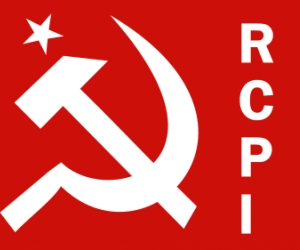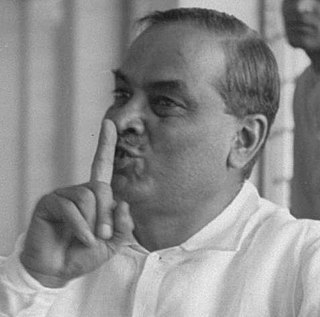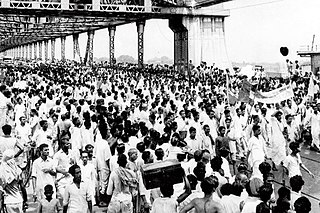Related Research Articles

The All India Forward Bloc (abbr.AIFB) is a left-wing nationalist political party in India. It emerged as a faction within the Indian National Congress in 1939, led by Subhas Chandra Bose. The party re-established as an independent political party after the independence of India. During the 1951–1952 and 1957 Indian general election, the party was known as Forward Bloc (Marxist). It has its main stronghold in West Bengal. The party's current Secretary-General is G. Devarajan. Veteran Indian politicians Sarat Chandra Bose (brother of Subhas Chandra Bose) and Chitta Basu had been the stalwarts of the party in independent India.

The Revolutionary Communist Party of India is a political party in India. The party was founded as the Communist League by Saumyendranath Tagore in 1934, breaking away from the Communist Party of India (CPI). RCPI led armed uprisings after the independence of India, but later shifted to parliamentary politics. The party is active in Assam, Kerala, West Bengal, Telangana and Andhra Pradesh. The party was represented in the West Bengal while being a part of Second United Front Cabinet (1969) as well as in various state government during the Left Front rule in the state (1977–2011). In Assam, the party won four Legislative Assembly seats in 1978, but its political influence has since declined in the state.

Manbhum District was one of the districts of the East India during the British Raj. After India's independence, the district became a part of Bihar State. Upon the reorganization of the Indian states in the mid-1950s, the Manbhum district was partitioned based on language. The Bengal-speaking areas were included in West Bengal, while the rest were kept with Bihar.

The West Bengal State Assembly Election of 1952 was a part of the series of Legislative Assembly elections in 1952. It was the first ever assembly election held in West Bengal.

The West Bengal state assembly election of 1957 was part of a series of state assembly elections in 1957.
Bandwan is an assembly constituency in Purulia district in the Indian state of West Bengal. It is reserved for scheduled tribes.
Balarampur Assembly constituency is an assembly constituency in Purulia district in the Indian state of West Bengal.
Joypur Assembly constituency is an assembly constituency in Purulia district in the Indian state of West Bengal.
Purulia Assembly constituency is an assembly constituency in Purulia district in the Indian state of West Bengal.
Manbazar is an assembly constituency in Purulia district in the Indian state of West Bengal. It is reserved for scheduled tribes.
Arsha Assembly constituency was an assembly constituency in Purulia district in the Indian state of West Bengal.
Hura Assembly constituency was an assembly constituency in Purulia district in the Indian state of West Bengal.
Elections were held in March 1952 for the Bihar Legislative Assembly. There were 276 constituencies with 50 of them being two-member constituencies. The Indian National Congress (INC) stormed into power. Shri Krishna Singh became the first elected Chief Minister of Bihar and Dr. Anugrah Narayan Sinha became the first Deputy Chief Minister cum Finance Minister of the state.

Labanya Prabha Ghosh (1897–2003), also called Labanya Devi, a Gandhian, was a prominent personality of the Indian freedom movement, from Purulia District of West Bengal. She lived for almost 106 years and during later part of her life, was forced to live in a poverty-stricken ashram, her only source of income being a pension paid for freedom fighters. All through her life, before and after independence of India, she fought for justice of common man.

The Bengali Language Movement of Manbhum was a cultural and political movement that took place in the then Bihar Province from 1912 to 1956. Post independence, between 1948 and 1956, the language movement spread intensely among the Bengalis of Manbhum. Through this movement created around the Bengali language, the public demand for the establishment of Bengali as one of the official languages of the Bihar, mainly Manbhum, was expressed. This language movement was first ever linguistic movement for Bengali language and the longest language movement in the world.
Satyapriya Banerjee was an Indian politician and trade unionist.
Khagendra Nath Dasgupta was an independence activist, minister in the West Bengal government, Leader of the Opposition in West Bengal Vidhan Sabha and Member of the Lok Sabha.
Bibhuti Bhusan Das Gupta was an Indian freedom fighter and politician.
The Revolutionary Communist Party of India, also known as RCPI (Tagore), was a political party in India, led by Saumyendranath Tagore. RCPI (Tagore) emerged from a split in the Revolutionary Communist Party of India in 1948. RCPI (Tagore) had a very minor role in Indian politics. Tagore served as the chairman of the party. The party published the Bengali fortnightly Ganabani ('People's Voice').
Bhajahari Mahato (1911–2003) was an Indian politician belonging to Lok Sewak Sangha. He was elected thrice as a member of the Lok Sabha.
References
- 1 2 Anjali Ghosh (1981). Peaceful Transition to Power: A Study of Marxist Political Strategies in West Bengal, 1967–1977. Firma KLM. p. 25.
- ↑ Jayanta Kumar Dab (2007). Local Politics and Indian Nationalism, Purulia, 1921–1947. Progressive Publishers. p. 244. ISBN 978-81-8064-136-7.
- 1 2 3 4 5 Anis Kumar Majumdar; Bhanwar Singh (1 January 1997). Regionalism In Indian Politics. Radha Publications. p. 133. ISBN 978-81-7487-094-0.
- 1 2 3 4 West Bengal (India); Jatindra Chandra Sengupta (1985). West Bengal district gazetteers. Vol. 12. State editor, West Bengal District Gazetteers. pp. 104–105.
- 1 2 3 4 5 R. V. Krishna Ayyar (1956). All India Election Guide. Oriental Publishers. p. 32.
- 1 2 3 4 5 Journal of Gandhian Studies. Vol. 10. Gandhi Bhawan, University of Allahabad. 1983. pp. 125, 127, 129.
- 1 2 3 Election Commission of India. STATISTICAL REPORT ON GENERAL ELECTIONS, 1951 TO THE FIRST LOK SABHA – VOLUME I (NATIONAL AND STATE ABSTRACTS & DETAILED RESULTS) Archived 4 April 2014 at the Wayback Machine
- 1 2 3 Election Commission of India. STATISTICAL REPORT ON GENERAL ELECTION, 1951 TO THE LEGISLATIVE ASSEMBLY OF BIHAR
- 1 2 3 4 Marcus F. Franda (8 December 2015). West Bengal and the Federalizing Process in India. Princeton University Press. pp. 55–56. ISBN 978-1-4008-7525-2.
- ↑ Thought. Vol. 9. Siddharta Publications. 1957. p. 116.
- ↑ "General Elections, India, 1962, to the Legislative Assembly of West Bengal" (PDF). Election Commission of India . Retrieved 4 December 2016.
- ↑ Profulla Roychoudhury (1977). West Bengal—a Decade, 1965–1975. Boipatra. p. 56.
- ↑ Link: Indian Newsmagazine. Vol. 9. 1967. p. 16.
- ↑ Asian Recorder. Vol. 13. 1967. p. 7634.
- ↑ Subhash C. Kashyap (1974). The politics of power: defections and state politics in India. National Pub. House. p. 509.
- 1 2 "General Elections, India, 1969, to the Legislative Assembly of West Bengal" (PDF). Election Commission of India . Retrieved 4 December 2016.
- ↑ Communist Party of India (Marxist). West Bengal State Committee. Election results of West Bengal: statistics & analysis, 1952–1991. The Committee. p. 379. ISBN 9788176260282.
- 1 2 "General Elections, India, 1971, to the Legislative Assembly of West Bengal" (PDF). Election Commission of India . Retrieved 4 December 2016.
- 1 2 Dwaipayan Bhattacharya (8 December 2004). Interrogating Social Capital: The Indian Experience. SAGE Publications. p. 148. ISBN 978-0-7619-3286-4.
- 1 2 West Bengal (India). Fact Finding Committee on Small & Medium Newspapers; Sasanka Sekhar Sanyal (1983). Report of the Fact Finding Committee on Small & Medium Newspapers, 1980. Information & Cultural Affairs Department, Government of West Bengal. p. 50.
- ↑ Jayanta Kumar Dab (2007). Local Politics and Indian Nationalism, Purulia, 1921–1947. Progressive Publishers. p. 248. ISBN 978-81-8064-136-7.
- ↑ Mainstream. Vol. 27. N. Chakravartty. 1989. p. 32.
- ↑ India Who's who. INFA Publications. 1973. p. 248.